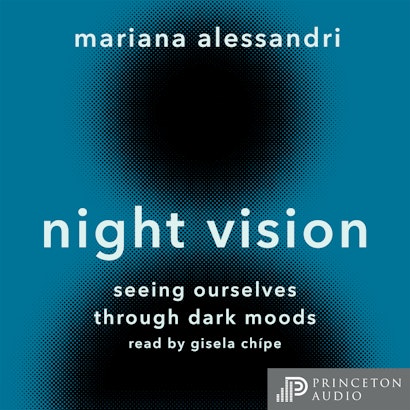Under the light of ancient Western philosophies, our darker moods like grief, anguish, and depression can seem irrational. When viewed through the lens of modern psychology, they can even look like mental disorders. The self-help industry, determined to sell us the promise of a brighter future, can sometimes leave us feeling ashamed that we are not more grateful, happy, or optimistic. Night Vision invites us to consider a different approach to life, one in which we stop feeling bad about feeling bad.
In this powerful and disarmingly intimate book, Existentialist philosopher Mariana Alessandri draws on the stories of a diverse group of nineteenth- and twentieth-century philosophers and writers to help us see that our suffering is a sign not that we are broken but that we are tender, perceptive, and intelligent. Thinkers such as Audre Lorde, María Lugones, Miguel de Unamuno, C. S. Lewis, Gloria Anzaldúa, and Søren Kierkegaard sat in their anger, sadness, and anxiety until their eyes adjusted to the dark. Alessandri explains how readers can cultivate “night vision” and discover new sides to their painful moods, such as wit and humor, closeness and warmth, and connection and clarity.
Night Vision shows how, when we learn to embrace the dark, we begin to see these moods—and ourselves—as honorable, dignified, and unmistakably human.
Awards and Recognition
Mariana Alessandri is associate professor of philosophy at the University of Texas Rio Grande Valley, the nation’s first bilingual university. In addition, she and her partner are the founders of RGV PUEDE, a nonprofit whose mission is to promote dual language education in South Texas public schools. They live on the border with their two tesoros. Find out more at marianaalessandri.com. Gisela Chípe is an Ecuadorian American actor whose film and television credits include Bel Canto with Julianne Moore and Ken Watanabe and NBC’s Manifest. She is the narrator of numerous audiobooks, including Glenn Stout’s Young Woman and the Sea and Above the Salt by Katherine Vaz.
“Night Vision provides a much-needed counterpoint to toxic positivity run amok. This book is for anyone who has ever been told to chill when they’re anxious, to cheer up when they’re depressed, or to count their blessings and stay positive when they’re grieving or ill. It will give you blessed validation that you’re not wrong or bad for having those feelings—just human. The world needs a lot of fixing, and learning to know and accept the reality of negative emotions may help us all understand more about how to fix it.”—Julie K. Norem, author of The Positive Power of Negative Thinking
“Night Vision is a stellar and courageous literary achievement. Writing with a nimble authorial voice that smoothly transitions from personal stories to philosophical insights, Alessandri contends that the distressing emotions and moods we try to banish with therapy or pills are more like teachers than demons, delivering self-knowledge, making us more human and more capable of sharing our humanity.”—Gordon Marino, author of The Existentialist’s Survival Guide
“Against the tyranny of optimism, Mariana Alessandri boldly validates our darker moods—like anxiety, grief, and anger—and teaches us not to fear them. Mining both philosophy and her own personal experiences as a teacher, she shows how our culture’s disparagement of these emotions weakens our capacity to learn from them and intensifies our unnecessary shame at feeling them. Night Vision is a refreshing embrace of the uncheerful self.”—Joshua Foa Dienstag, author of Pessimism: Philosophy, Ethic, Spirit
“In facing the darkness of life and its unsettling truths—with courage, compassion, and something like hope—Alessandri has written a book for our time, and for every time. Night Vision is brilliant and unflinchingly pitch black.”—John Kaag, author of Sick Souls, Healthy Minds: How William James Can Save Your Life
“Night Vision is a magnificently written and refreshing analysis of our modern obsession with lightness and positivity. Drawing on Plato, bell hooks, Audre Lorde, María Lugones, and many other philosophical perspectives, Alessandri presents a persuasive case for us to transform our perception of darkness so that we’re more empathetic toward ourselves and understanding of others. It’s scholarly, energizing, and delightful.”—Skye C. Cleary, author of How to Be Authentic: Simone de Beauvoir and the Quest for Fulfillment
“Mariana Alessandri’s Night Vision invites us to linger, as she has, with the darknesses that are part of our human condition. It is a bold and uncompromising book, one that takes us beneath the platitudes of ‘Suffering is good for you’ or ‘Get over it’ into something deeper, more troubling, and more powerful. Many of us will recognize among the vulnerabilities she dwells with here at least one that is our own.”—Todd May, author of Death

